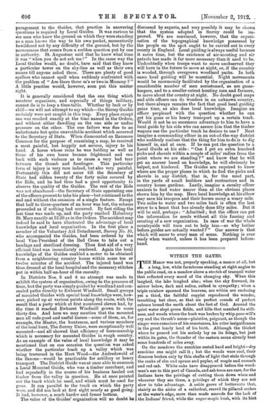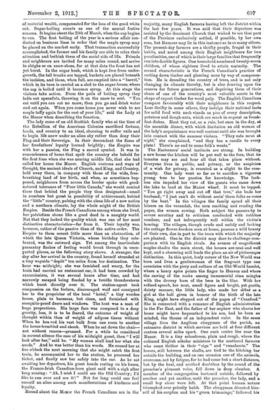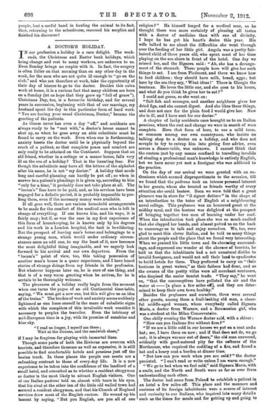WITHIN THE GATES. T KE Manor was not, properly speaking, a
manor at all, but a long, low, white farmhouse standing at right angles to the public road, on a meadow above a stretch of tranquil water that reflected every mood of the changing sky. When this laughed, the lake laughed also ; when the sky frowned, its mirror below, dark and sullen, sulked in sympathy; when a triple rainbow spanned the heavens, arc within aro enclosing yet a third, the faithful copyist reproduced the wonder, trembling but clear, so that six perfect rounds of perfect colours bound the earth about the feet of God. Around the quiet water slept green fields, and hills that matched its still- ness, and woods where the hush was broken by whip-poor-will's cry and the thrush's notes—plaintive, poignant, as though the singer were conscious of his remoteness, his utter insignificance in the great lonely land of his birth. Although the thicket where he poured out his melody lay on its fringe, but just within its gates, the thunder of the eastern ocean already beat some hundreds of miles away.
On the meadows the sunshine rested hard and bright—dry sunshine one might call it ; but the woods were cool, their dimness broken only by thin shafts of light that stole through the ranks of elm and spruce and poplar, of maple and sumach and red oak. White oaks have disappeared before the wood- man's axe in this part of Canada, and ash trees are rare, for the Indians have the privilege of cutting them down when and wherever they see them, a privilege of which they are not slow to take advantage. A noble grove of butternuts that, stately as the aisles of a cathedral, reared its pillared arches at the water's edge, more than made amends for the lack of the Indians' friend, while the sugar-maple bush, with its hint
of material wealth, compensated for the loss of the good white oak. Sugar-boiling counts as one of the annual festive seasons. It begins about the 25th of March, when the sap begins to run. The first boiling of the year is a serious affair con- ducted on business lines in order that the maple syrup may be placed on the market early. That transaction successfully accomplished, the farmer and his family are able to relax their attention and bethink them of the social side of life. Friends and neighbours are invited for many miles round, and arrive in sleighs or on snow-shoes, for at that date the frost has not yet burst. In the sugar bush, which is kept free from under- growth, the tall trunks are tapped, buckets are placed beneath the incision, and these, when full, are emptied into a " barrel," which in its turn is carried on a sled to the sugar-house, where the sap is boiled until it becomes syrup. At this stage the visitors take action. From the pails of boiling syrup they ladle out spoonfuls, throwing it on the snow to cool. " You eat until you can eat no more; then you go and drink water and eat again. When you Come home you never wish to see maple taffy again for the rest of your life," said the Lady at the Manor when describing the function.
The lady came of an old Scottish family who at the time of the Rebellion of the American Colonies sacrificed fortune, lands, and country to an ideal, choosing to suffer exile and to begin life anew under an alien sky rather than deny their Flag and their Sovereign. In their descendant the flame of her forefathers' loyalty burned brightly; the Empire was with her a passion, the Flag a sacred symbol It was in remembrance of home that spelt the country she beheld for the first time when she was nearing middle life, that she had called her house the Manor. English customs and ways of thought, the ancient ideals of Church, and King, and Country, held sway there, in company with those of the wide, free- breathing land of her birth, and when, as sometimes hap- pened, neighbours from across the border spoke with good- natured tolerance of "Poor little Canada," she would remind them that behind the people they thus designated—small in numbers but great in possibility of achievement, behind the "little" country, pulsing with the clean life of a new nation and a northern climate, lay the whole might of the British Empire. Beside the French Canadians among whom she lived, her patriotism shone like a good deed in a naughty world. Not that they lacked the quality which was one of her most distinctive characteristics—far from it. Their loyalty was, however, rather of the passive than of the active order. The Empire to them meant little more than an abstraction, of which the late Queen Victoria, whose birthday they cele- brated, was the outward sign. Yet among the inarticulate peasantry flashes of feeling would break through in unex- pected places, as the following story shows. A stranger, the day after her arrival in the country, found herself stranded at a tiny wayside "depot" ten miles from her destination. The hour was midnight; she was famished and weary, for the train had carried no restaurant car, it had been crowded by excursionists, it was several hours after time, and had narrowly escaped being flooded by a terrific thunderstorm which burst directly over it. The station-agent took compassion on the forlorn, discouraged waif and consigned her to the proprietor of the local "hotel," a tiny wooden house, plain to bareness, but clean, and furnished with mosquito-proof doors and windows. The host was a man of huge proportions. His large face was composed to a deep gravity, less, it is to be feared, the outcome of weight of thought within than of weight of adipose tissue without When he hen ved his vast bulk from one room to another the house trembled and shook. When he sat down the chair— not without reason—groaned. For a while he considered in earnest silence the ease of his midnight guest, then "I will look after her," said he. "My woman shall lend her what she needs." And he was better than his words. He roused her at Jive o'clock the next morning that she might catch the first train, he accompanied her to the station, he procured her ticket, and finally saw her safely into the car. As he sat awaiting her departure, his great hands resting on his knees, the Franco-Irish Canadian-born giant said with a sigh after long musing : " Ah, I wish I could see the Old Country; I'd like to run over and see it! " Not for long could one feel oneself an alien among such manifestations of kindness and loyalty.
Round about the Manor the French Canadians are in the
majority, many English farmers having left the district within the last few years. It was said that their departure was assisted by the dominant Church that wished to see that part of the Province exclusively settled, if possible, by her own sons, but Rumour may lie in this instance as in so many others. The present-day farmers are a thrifty people, frugal in their habits, and noted among their English neighbours for two peculiarities, one of which is their large families that frequently run into double figures. One household numbered twenty-seven children, of whom eighteen lived to attain maturity. The second characteristic is the French Canadian's practice of cutting down timber and planting none by way of compensa- tion. He is denuding the country of trees, and is not only changing its climate thereby, but is also drawing upon the reserve for future generations, and depriving them of their share of one of the country's most valuable assets in the
shape of export timber for wood pulp. The English Canadians compare favourably with their neighbours in this respect. Less thrifty in some others, they indulge their national taste for solid food with such viands as pies of every description, potatoes and dough-nuts, which are much in request as break- fast dishes. Meat they eat, as a rule, but once in the day, at the noontide dinner, with which limitation an old woman of the lady's acquaintance was well content until she was brought into contact with the summer visitors. "They eats meat sA night," she complained, "and they has a candle to every plate ! There's no end to some folk's wants."
The Easterners' social instincts are strong. In building a new holm the kitchen will be put well to the fore, that its inmates may see and hear all that takes place without. Everyone lives in public, and privacy, or the suspicion of a wish for privacy, is resented as a slight to the com- munity. One lady went BO far as to sacrifice a vigorous young tree to her passion for knowledge. The luck- less elm impeded her view of the guests who came down the lake to land at the Manor wharf. It must be topped.
" You go right away and cut off that tree," she bade her husband; "I just can't do without seein' them folks as come
by the boat." In the villages the family spend all their leisure on the verandah, the men smoking and reading the paper, the women sewing. Both subject the passers-by to severe scrutiny and to criticism conducted with ruthless candour, and not infrequently well within the victim's hearing. The villages, though crude and untidy and lacking the cottage flower-borders seen at home, possess a wild beauty of their own, due in part to the trees with which the majority are planted. One in the district may dare to challenge com- parison with its English rivals. An avenue of magnificent maples shades the main street, the houses are neat and well kept, and a charming mill lends the place an air of picturesque distinction. In this quiet, leafy corner of the New World was born and lives a gentlewoman of the fragrant type one associates with the piety and culture of an Old-World hamlet, where a hoary spire points the finger to Heaven and where the cawing of the rooks among immemorial elms mingles with the drowsy hum of the bees in the lilac. With her refined speech, her neat, small figure and bright, yet gentle, dainty manner, the little lady, who made her d.lbut as a girl at the ball given in honour of the birth of the late Bing, might have stepped out of the pages of " Cranford." She is connected with a romance of English administration in the Far East, and the father of her nephew who shares her home might have bequeathed to his son, had he been so minded, the throne of an independent ruler. In the same village lives the Anglican clergyman of the parish, an extensive district in which services are held at four different centres several miles apart. One such centre lies near the Manor. It is a tiny schoolroom, plain and rough, where the cultured English scholar ministers to the scattered farmers who come thither in their " rigs " and " runabouts." The horses, still between the shafts, are tied to the hitching bar outside the building, and on one occasion one of the animals, overcome, not by fatigue, for he had come but a short distance, but by the heat, and soothed doubtless by the sound of the preacher's pleasant voice, fell down in deep slumber. A. member of the congregation hastened outside, followed by another and yet another, until the preacher, the lady, and a small boy alone were left. At that point human nature triumphed over priestly habit. The clergyman divested him- self of his surplice and his "green trimmings," followed his
people, lent a useful band in hauling the animal to its feet, then, returning to the schoolroom, resumed his surplice and finished his discourse!




























































 Previous page
Previous page